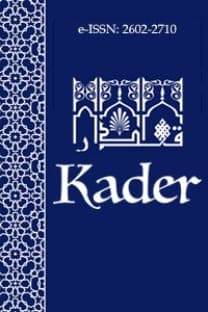Aşık Dertli ve Divan'ında İtikadi Düşüncesi
-
-
___
- Aclûnî, Keşfu’l-Hafa, Thk. Ahmet Kalâş, Müessesetü’r-Risâle, Beyrut, 1405.
- Bedri Noyan, Bütün Yönleriyle Bektâşîlik ve Alevîlik, IV/77, Ankara, 2001.
- Birgören, Hamdi, Âşık Dertli Dîvânı, 1. Baskı, Bolu, 2011.
- Çiftçi, Şaban, Günümüz Alevi-Bektaşi Kültüründe Hadis, Isparta, 2011.
- Düzgün, Dilaver, Dertli Divanı, Karşılaştırmalı Metin, Erzurum, 20011.
- Ergun, S. Nüzhet, Alevi-Bektaşi Şiirleri Antolojisi, İstanbul, 1955.
- Esed, Muhammed, Kur’an Mesajı, İstanbul, 1996.
- Günay, Umay, “Âşık Veysel ve Âşık Tarzı Şiir Geleneği”, Hacettepe Üniversitesi Edebiyat Fakültesi Dergisi, Cilt 10/ Sayı 1 / Temmuz 1993.
- İbn Hişam, es-Siretü’n-Nebeviyye, Thk. Mustafa eş-Şekka, İbrahim el-Ebyari, Abdulhafız Şelebi, Beyrut, 1994.
- İbnu’l-Esir, el-Kamil fi’t-Tarih, C. II, s. 154, Daru Sadır Beyrut, 1399.
- Köprülü, Fuad, Türk Saz Şairleri, cilt: V, Ankara, 1965.
- Öztürk, Mustafa, Kur’an- Kerim ve Meali, Düşün Yayınları, İstanbul, 2012.
- Mazıoğlu, Hasibe, “Bolu Çevresinde Yetişen Şairler ve Dertli”, Bolu İl Halk Edebiyatı Sempozyumu, 2-4 Mayıs 1986, Bolu, 1987.
- Oğuz, M. Öcal, “Dertli’nin Tarikati Meselesi”, Milli Folklör, cilt: 5, sayı: 34, Yaz 1997.
- Osman Cemal Kaygılı, İstanbul’da Semai Kahveleri ve Meydan Şairleri, İstanbul, 1937.
- Sakallı, Talat, Rüya ve Hadis Rivayeti, Isparta, 1994.
- Tokel, Bayram Bilge, Bağımıza Gazel Düştü, Akçağ Yay., Ankara, 2002.
- Uyguner, Muzaffer, Dertli, Yaşamı, Sanatı ve Şiirlerinden Seçmeler, İstanbul, 1991.
- Yayın Aralığı: 2
- Başlangıç: 2003
- Yayıncı: Mehmet BULĞEN
Kelamcıların Problemleri Ele Alışında"Çevre" Unsurlarının Etkisi: "Elem Problemi Örneği"
Kelamcıların Problemleri Ele Alışında"Çevre" Unsurlarının Etkisi: "Elem Problemi Örneği"
HÂRİS EL-MUHÂSİBÎ’YE GÖRE HABERÎ SIFATLAR
Gayb Meselesi ve İbn Berrecan'ın Keşfi Üzerine Bir Değerlendirme
İnsan Tabiatı Bağlamında Kimlik ve Kişilik Kavramlarının İrdelenmesi
LÜTUF KAVRAMI DOLAYIMINDA ŞÜKRÜN GEREKLİ ŞARTLARI ÜZERİNE FARKLI BİR BAKIŞ
Gazzali'nin Kelam Hakkında Son Sözü
Sibel KAYA, Muhammed ÇİFTÇİ, Fiazuddin ŞUAYB
İmâm Maturidî?nin Deist Eleştirilere Karşı Nübüvvet Savunusu
